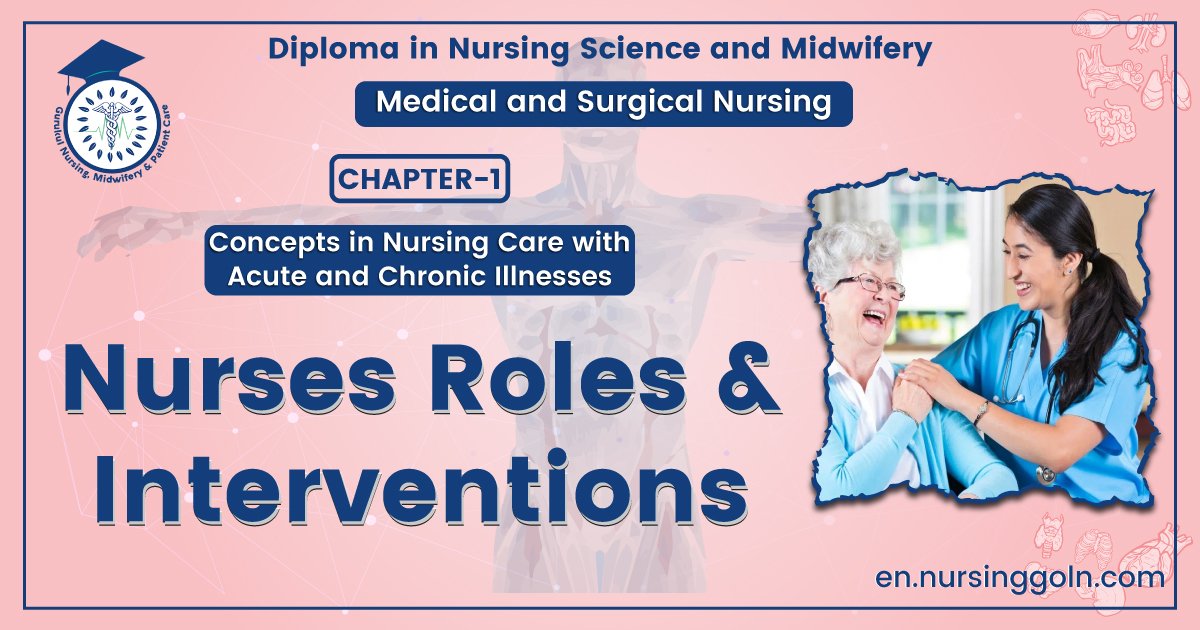Nurses Roles and Interventions – This course is designed to understand the concept of community health nursing: nurses’ roles and interventions in family health, school health, occupational health, environmental health, elderly health care, gender issues, disaster management, and principles and terminology of epidemiology. The aim of the course is to acquire knowledge and skills in community health nursing.

Nurses Roles and Interventions
The Nurses’ Roles and Competencies Required in Promoting, Maintaining and Restoring
Health:
The nurses’ roles and competencies required in promoting, maintaining and restoring health are –
1. Care giver
2. Teacher
3. Counselor
4. Diagnostic and monitoring role
5. Administering and monitoring treatment regimens
6. Manager
7. Researcher
8. Monitoring and ensuring care quality.
9. Change agent
10. Client advocate
| Nurses Roles | Description |
| 1. Care giver | a) As a caregiver, a nurse provides hands-on care to patients in a variety of settings. b) This includes physical needs, which can range from total care (doing everything for someone) to helping a patient with illness prevention. c) The nurse maintains a patient’s dignity while providing knowledgeable, skilled care. |
| 2. Teacher | a) Educate patient to develop self-care abilities b) Provide knowledge to allow pt. to make informed decisions c) Demonstrate needed skills d) Promote health, prevent illness, restore health & facilitate coping |
| 3. Counselor | a) Assist and guide patient in solving problems or making decisions b) Utilize the interpersonal (helping) relationship c) Provides emotional, intellectual to and psychological support |
| 4. Diagnostic and monitoring role | This is a critical role that nurses do on a regular basis to identify nursing problems: a) In some groups of patients such as those in critical care settings. b) In some vulnerable groups such as the elderly or patients with impaired cognitive function, this role is prominent and requires knowledgeable and skillful nurses to early detect serious problems. c) Being assessors, nurses identify problems, causes and risk factors. d) Therefore they are able to alleviate suffering, prevent complications and relapse of their client health problems. |
| 5. Administering and monitoring treatment regimens | Nurses as treatment caretaker- a) Nurses work in collaboration with physicians. b) Physicians’ prescriptions are delivered to the patients by nurses. Such as –
c) Carrying out this role, the client receives full range of treatment regiments. |
| 6. Manager | a) Plans b) Organizes c) Directs d) Controls e) Delegates |
| 7. Researcher | a) Collect data to improve nursing practice b) Provides info for evidenced-based practice c) Studies are done on nursing practice, education & administration d) Provides professionalism to nursing |
| 8. Monitoring and ensuring care quality | a) Nurses are also involved in evaluating and modifying the overall quality of care given to groups of clients. b) Nursing efforts are to monitor and improve patient care through quality assurance, quality improvement |
| 9. Change agent | a) Initiate changes or assist clients to make modifications in themselves or in the system of care. |
| 10. Client advocate | a) Protect and support the patient. b) Patient representative for all patient. c) Provides explanation in client’s language and support client’s decisions. d) Assertiveness e) Promote self determination |

Other Additional Roles of a Nurse:
| Roles | Description |
| 1. Coordinator | a) Coordinates and plans care b) Piece together fragmented care |
| 2. Communicator | a) Establish rapport b) Establish therapeutic (helping) relationship c) Be aware of verbal & nonverbal communication d) Assertive communicator |
| 3. Leader | a) Have visions to energize others b) Motivates others to achieve goals c) Encourages others to do their best d) Works collaboratively |
| 4. Motivator | a) Motivation- Internal impulse that allows one to take action or change behaviors. b) Nurses motivate patients to make changes by: having a positive attitude, listening to patient needs, encouraging, rewarding, and devoting time and energy to assist with changes. |
| 5. Critical Thinker | a) A way of looking at problems other than the obvious b) “Thinking outside the box” c). Open to new ideas |
